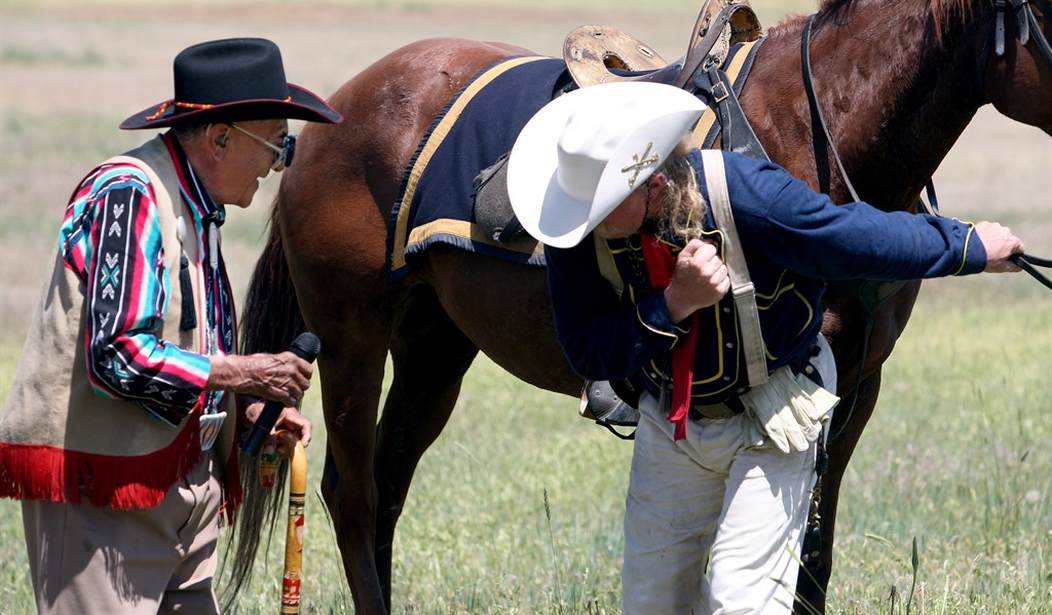Five score and forty-five years ago, Lieutenant Colonel George Armstrong Custer, the “Boy General” of the Civil War, and most of his troopers were killed at the Battle of the Little Bighorn—or were they?
I’ve written a series of comic novels that tell the story of how Custer was actually rescued by an Indian princess, and went on to lead a life, undercover, as a knight-errant in the West. The stories are meant to funny, and driven by action and adventure, but I confess, they have a point.
That point is easily summarized by asking what it means to be an American—and how long American civilization, as we have traditionally understood it, can last. I won’t keep you in suspense. As I told a recent interviewer, I reckon it’s later than many of us would like to think.
Anyone who grew up in the 1960s and 1970s and watched the movie Patton, had to have an uncomfortable feeling, during the opening monologue, when Patton explains “why Americans have never lost and will never lose a war,” and worry about America’s future, post-Vietnam.
Maybe even more to the point is the opening monologue from a less well-known movie, the John Milius-Tom Berenger 1997 film Rough Riders, where a soldier reminisces about the events leading up to the Spanish-American War and the formation of the 1st United States Volunteer Cavalry: “My God we were young. Well, it was a young country then, full of promise and hope. Anything was possible if—if you were an American.”
He goes on: “Wasn’t the same for other folks. Down South—Cuba—hell, they just wanted to be left alone, breathe free, like we done. Them folks in Spain, the Old World, wouldn’t let ’em. It caused quite a fuss.”
Recommended
Coming together as “Rough Riders” were cowboys, Indians, Mexican Americans, former Confederates, an East Coast, noblesse oblige, Shakespeare-quoting aristocracy—an e pluribus unum force united by a sense of freedom, liberty, and manifest destiny.
Who would define our country as such today?
Indeed, those heroes—some of them (like Theodore Roosevelt) or men just like them—and their ancestors were the sort who had their statues toppled just last year, and not only toppled by mobs, but shamefacedly removed by government officials all across the country.
Fighting Joe Wheeler, a Confederate general who also served as a general with the Rough Riders, is one of those Confederate heroes (with a bronze statue in the United States Capitol and several locations named after him) that Democrats and a distressing number of Republicans would rather banish than honor.
Things many of us considered certainties, even in the supposedly crazy 1960s and 1970s—that men are men and women are women; that a husband takes a wife, not another husband; that the founders were political geniuses who gave us a precious system to protect our God-given unalienable rights; that the Civil War was an American Iliad of courageous Greeks versus valiant Trojans each, in Theodore Roosevelt’s famous words, fighting “with equal bravery and equal sincerity of conviction, each striving for the light as it was given him to see the light”—have been utterly overturned. It’s happened suddenly—though, if one is so inclined, it’s easy to trace the steps that radicals laid, and that many well-meaning people unthinkingly followed, that brought us here.
I remember growing up with Custer as a hero. My vision of him was embodied by Errol Flynn in the movie They Died with Their Boots On. I knew others disagreed, but I dismissed them as the same sort of anti-American leftists who protested the Vietnam War and thought that nearly every American military officer was a crazed, bloodthirsty imperialist eager to commit a My Lai Massacre. As a boy from the provinces, I was surprised, later, to find “conservatives” who agreed with the Left on Custer (and also agreed with the Left on the French Revolution, “systemic” racism, and just about every “social” issue).
I leave you with this warning: a society that will not acknowledge the basic truths of human biology (and indeed propagandizes against them); that does not honor its founding fathers and jealously guard the constitutional rights they promulgated for us; that does not honor the men who served the nation (like Custer); that does not regard with magnanimity the contending sides of our tragic Civil War, as Custer, a Union officer, actually did: (he did not hate his Southern foes any more than his Indian foes; he actually liked and admired both of them); that believes our country was ill-founded, a source of vicious racism, with a history of nearly ineradicable bigotry from which we should all repent; will not long stand.
What is an American? Custer knew. We all knew until practically yesterday. But ask kids of your acquaintance, ask your liberal neighbors, ask even your Republican congressman, if you have one, and you might be surprised by the answers. You might be horrified too. Remember Ronald Reagan’s much quoted lines that “Freedom is never more than one generation away from extinction. It has to be fought for and defended by each generation.” Then ask yourself what you have done to defend freedom, and truth, and our vision of what America was, is, and should be. The hour is late, the task before us is daunting, but our preservation, if it is possible, begins with reclaiming our patriotic past.
Historian and novelist H. W. Crocker III is the author of many books, including Robert E. Lee on Leadership and The Politically Incorrect Guide to the Civil War. His most recent books are the comic novels Armstrong and Armstrong Rides Again!
























Join the conversation as a VIP Member